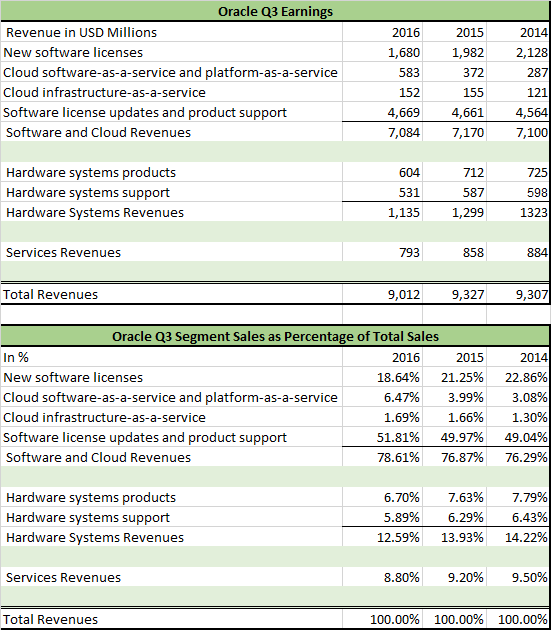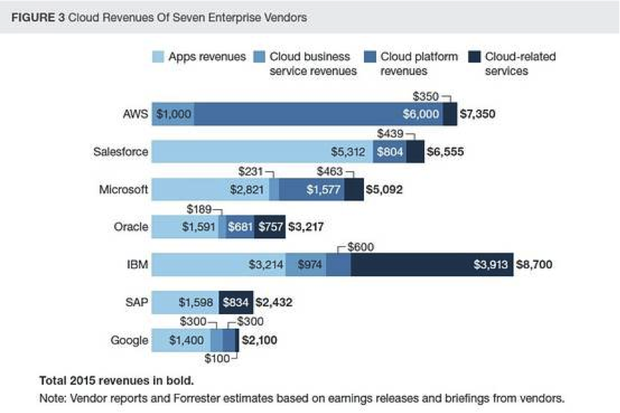
Oracle picks up another company while their lawsuits with HPE and Google pick up steam. Meanwhile, IBM opens up their new quantum platform to the masses (I am still waiting for my login).
Teradata ditches their CEO after announcing a $46M loss in the marketing space as EMC CEO Joe Tucci says goodbye at EMC World.
IBM
- IBM Launches Quantum Computing As Free Cloud Service
In IBM’s vision, online access will pave the way for future developments and spark interest for the new technology. Depending on how well versed people are in quantum technology and their overall technology background, IBM will determine how much access people receive to the processor, according to the manager of IBM’s experimental quantum computing group, Jerry Chow. He explained for The New York Times that the online quantum computing simulator is meant to be educational, but it could also “be the beginnings of a larger framework.”
http://www.itechpost.com/articles/17852/20160505/ibm-launches-quantum-computing-free-cloud-service.htm
Note: This is a true 360 degree video, click in the video to change the camera view - IBM’s iPhone app will help 20 million Americans keep their sight
Why might the app make a difference? “The process for managing patient information today is still very much a manual process for many cataract surgeons,” explained Chang. “With this app, surgeons will now have the ability to access each patient’s surgical information in one place, receive intuitive feedback for IOL selection, and help improve future procedures while driving greater efficiencies in managing patient flow; an incredible benefit for practices.”
- IBM To Downsize Rochester Campus
The tech company from Armonk, New York will be selling off upwards of one million square-feet of its Rochester campus. However, no personnel changes are expected to occur, according to a statement by Tory Johnson, the senior location executive for IBM’s Rochester site.
http://tcbmag.com/News/Recent-News/2016/May/IBM-To-Downsize-Rochester-Campus
Oracle
- Oracle Buys Utility-Focused Cloud Firm Opower for $532 Million
That rapid growth made Opower an attractive acquisition target for Oracle, which itself has a large business division targeting the utilities sector. By adding Opower to its existing energy industry portfolio, Oracle said it will become “the largest provider of mission-critical cloud services” to a sector valued at $2.3 trillion.
http://www.cio-today.com/article/index.php?story_id=010000BLD85W
More:
Can Oracle buy its way into the cloud?It stands to reason that traditional enterprise vendors — Oracle, Microsoft, IBM and SAP — would have at least a shot at that new business. But it’s no slam dunk, largely because of customers’ past experiences with those vendors, Rymer said.
“It’s no secret that a lot of people don’t like dealing with Oracle, and there are similar relationship horror stories about all the big enterprise vendors,” he said. “A lot of folks say, ‘We don’t want the same kind of relationship we have with them now.'”
AWS, Azure and Google all promise something more flexible, and for some customers the trade-off is worthwhile even if it means more work.
“The big enterprise vendors understand enterprises,” Rymer said. “I think they have a chance, but we’ll see how that tension plays out.”
http://www.cio.com/article/3064658/can-oracle-buy-its-way-into-the-cloud.html
- Alphabet Inc To Face Off Against Oracle Corporation Next Week In $8.8 Billion Lawsuit
The case between these two tech giants previously went on trial in 2012, but the jury made no progress. If the new jury, in the trial that is scheduled to begin on Monday, rules in favor of Oracle concerning the fair-use copyright, then it will consider the damages.
After the initial trial, William Alsup, a United States District Judge, gave the verdict that the material in the issue in case at hand is not supposed to be subject to copyright. However, a federal appeals court reversed this ruling, arguing that the structure of any programming language can be protected.
- HP Fires Back at Oracle Copyright Suit
HPE’s lawyers at Gibson, Dunn & Crutcher pointed to Oracle’s litigation targeting Terix in a court filing Friday asking U.S. District Judge Jon Tigar of the Northern District of California to dismiss the case against HPE. “Oracle seeks to hold [HPE] responsible for Terix’s conduct based on vague allegations of conspiracy and control,” wrote Gibson Dunn partner Blaine Evanson. “While Oracle recounts what Terix did to infringe Oracle’s copyrights, it fails to plausibly allege facts demonstrating how HPE knew that Terix was infringing, what steps HPE took to encourage Terix to infringe, or that HPE had the ability to control Terix.”
- Oracle Needs More Time
If you ask me to name one company that’s going to be hit the worst during the massive shift towards cloud computing, I would say “Oracle” (NYSE:ORCL) in a heartbeat. Their entire business line was once dependent on companies managing their own infrastructure; as part of that model, Oracle made billions selling them hardware and software designed specifically for their needs.
Today, as significant portions of the enterprise segment look towards TCO (total cost of operation) reduction and global accessibility in the form of what cloud computing offers, Oracle stands in an ever-widening gap. Even their core databases business – of which they are still king – are increasingly under attack from the likes of Microsoft and Amazon. This is something I’ve already spoken about in Oracle’s Rite Of Passage Has Come.
Storage (EMC | Dell | Infinidat | NetApp )
- EMC World 2016: Joe Tucci bows out as EMC looks to the future
“If you look at the magnitude of data processed and the need for this to be interpreted in real-time, the outcome is a new style of computing,” he added. “We have to change not only very rapidly but very dramatically and on a personal note, it’s been an incredible journey.
“I thank our partners and customers as this will be the last time I stand here at EMC World as EMC Corporation CEO and Chairman.”
http://www.arnnet.com.au/article/599096/emc-world-2016-joe-tucci-bows-emc-looks-future/
- EMC & Dell execs outline integration plan to create Dell Technologies
The final hurdles the team face are the Chinese regulators, the one remaining body to have not signed off on the merger to date. While Chinese regulators have proven to be a difficulty for other organizations in the past, Read and Elias claim it should be a relatively simple process for the team. Read highlighted the fact that all other regulatory bodies had signed off on the deal 100% with no condition attached, it was a good sign when considering the Chinese regulatory process.
- Michael Dell roasts HP at EMC World
“Our competitors like HP are shrinking their way to success,” he said. “Wait, you can’t shrink your way to success. That is not even a real thing! But they’re doing it. They are getting smaller. They are separating their edge from their core with far less revenue, less innovation in R&D, less software, a smaller supply chain, losing share in each of their businesses to Dell, even right now during this period.
http://www.channelweb.co.uk/crn-uk/news/2456674/michael-dell-roasts-hp-at-emc-world
- Tucci and Dell on Partner Strategy
Other
- Google handed patients’ files without permission: Up to 1.6million records – including names and medical history – passed on in NHS deal with web giant
Trust managers approached Google to develop the app and then handed over the patient files after signing an ‘information-sharing agreement’ last year. Neither the trust nor Google needed to ask patients’ permission beforehand because the NHS is obliged to pass on some anonymous medical information if it is intended for research purposes to improve care.
Also:
Under the arrangement, Google’s DeepMind has access to the details of all patients who have stayed overnight at Barnet, Chase Farm or Royal Free Hospitals or attended A&E over the past five years. It is not clear exactly how many patients this covers. The company will also be given information on a monthly basis relating to all inpatients and those attending casualty until 2017.
Although patients can theoretically opt out of their information being passed on in such a way, they would firstly need to be aware such arrangements exist. They would then need to contact the hospital’s data protection officer in writing to make a specific request.
- Canonical founder: “OpenStack no lifeline for legacy tech suppliers”
“What do customers want? They don’t want to get locked in to someone’s database as a service they happen to have dumped on OpenStack,” he said.“They want database as a service and they want it on every public cloud and on private cloud. They’re not going to get it just on OpenStack.”
- Here’s why Apple’s partnership with SAP is amazingly strategic and smart
SAP is going to develop a bunch of custom business applications for iOS devices, iPads and iPhones, as well as release tools so that SAP’s 2.5-million member global developers can write their own custom iOS apps using Apple’s new programming language, Swift.
In return, Apple gets access to SAP’s enormous worldwide salesforce to help it sell devices to SAP’s roughly 310,000 worldwide customers, most of whom are large enterprise businesses with thousands of employees.
http://www.businessinsider.com/why-apple-sap-partnership-is-smart-2016-5
- Teradata names new CEO
On a day when Teradata reported a net loss of $46 million in the first quarter of 2016 — a loss of 36 cents per diluted share — the data warehousing and analytics company also announced that its board of directors has elected one of its own, Victor Lund, as the company’s president and chief executive.
The first quarter’s net loss contrasts with its net income of $22 million, or 15 cents per diluted share, in the first quarter of 2015. Lund succeeds Mike Koehler who has stepped down as Teradata’s president, CEO and board director, effective immediately, the Miami Twp. company said.
http://www.daytondailynews.com/news/news/teradata-names-new-ceo/nrHZL/
- Review: HPE’s machine learning cloud overpromises, underdelivers
Feels like something I mentioned on Episode 22.Overall, Haven OnDemand services are comparable to the Watson services in Bluemix — that is, mostly applications of machine learning, which you can call from your own applications and apply to your own data. There’s clearly some experience behind the text and search services from HPE IDOL and KeyView, but many of the other services show rough edges.
For example, I was disappointed by the prediction service’s limitation to binary classification problems. In its defense, however, it is still in a preview stage, and it attempts to automate the entire binary classification process, including parts that other services leave up to the analyst. Similarly, I was disappointed to discover that the image recognition service has only been trained against a database of corporate logos — and doesn’t even have the excuse of being in preview.
Photo: Ashes Sitoula







